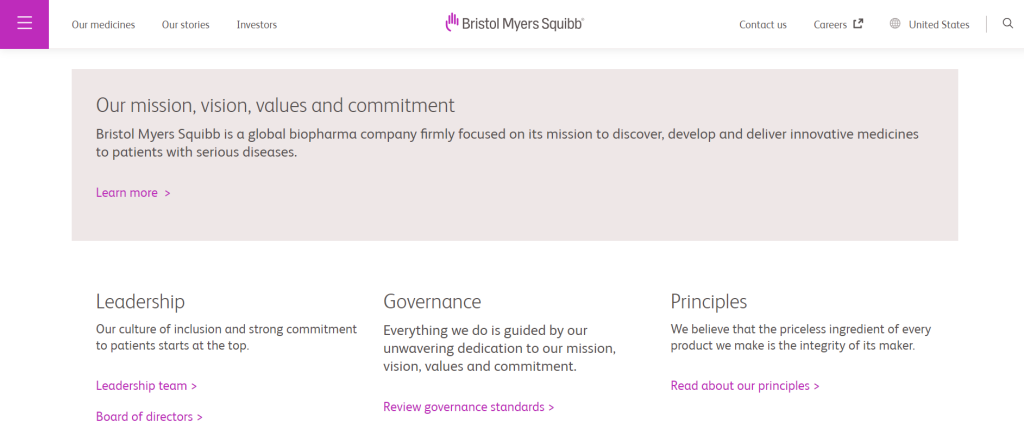Table of Contents
ToggleA Brief History of BMS
Bristol-Myers Squibb Company, often referred to as BMS, was founded in 1858 by Edward Robinson Squibb in Brooklyn, New York. Originally known as the E.R. Squibb & Sons, the company started out as a small pharmaceutical and chemical manufacturing business. Squibb’s focus on quality and innovation quickly set the company apart, and by the late 19th century, it was one of the leading pharmaceutical companies in the United States.
In 1887, William McLaren Bristol and John Ripley Myers purchased the Clinton Pharmaceutical company in Clinton, New York, and in 1889, the company changed its name to Bristol, Myers, and Company. Over the years, the company continued to grow and expand its product offerings, including the development of several important medications and vaccines.
In 1989, Bristol-Myers and Squibb merged to form Bristol-Myers Squibb Company. The merger created one of the largest and most comprehensive pharmaceutical companies in the world, with a focus on developing innovative treatments for cancer, cardiovascular diseases, HIV/AIDS, and other serious health conditions. Since then, the company has continued to expand its global reach and invest in research and development to bring new and innovative therapies to patients around the world.
Today, Bristol-Myers Squibb is a leading global biopharmaceutical company with a mission to discover, develop, and deliver innovative medicines that help patients prevail over serious diseases. The company continues to be recognized for its commitment to scientific excellence, and its dedication to improving patient outcomes and the quality of life.
How Owns BMS?
Bristol-Myers Squibb Company is owned by its shareholders, who collectively hold ownership in the company through their shares. The top 10 shareholders of Bristol-Myers Squibb Company as of most recent data are:
1. The Vanguard Group, Inc.
2. BlackRock, Inc.
3. SSgA Funds Management, Inc.
4. Capital World Investors
5. Capital Research & Management Co.
6. Wellington Management Company, LLP
7. State Street Corporation
8. Northern Trust Investments, Inc.
9. Geode Capital Management, LLC
10. Morgan Stanley & Co. LLC
These institutional investors and funds hold significant ownership in the company and have a stake in its performance and success in the market.
BMS Mission Statement

Bristol-Myers Squibb Company’s mission statement is to discover, develop, and deliver innovative medicines that help patients prevail over serious diseases. They are committed to advancing the science of medicine to improve the lives of patients, and to aligning their actions and decisions with the best interests of patients and their caregivers. Their mission is underscored by their dedication to integrity, transparency, and excellence in all aspects of their work.
How BMS Makes Money?
Bristol-Myers Squibb Company generates its revenue primarily through the sale of pharmaceutical products and biopharmaceutical research. The company develops and manufactures a wide range of prescription drugs, including treatments for cancer, cardiovascular diseases, and immune disorders. In addition to direct sales to patients and healthcare providers, Bristol-Myers Squibb also earns revenue through licensing agreements and collaborations with other pharmaceutical companies. The company’s business model focuses on innovation and leveraging its expertise in biopharmaceutical research to create and market new medications, driving continued growth and profitability.
BMS Business Model Canvas
The Business Model Canvas is a strategic management tool used to visually represent and analyze a company’s business model. It provides a comprehensive framework for understanding the key elements of a business and how they interact with each other. The canvas consists of nine building blocks that cover the core aspects of a business, including its customers, value proposition, revenue streams, key activities, and more. In this case, we will be applying the Business Model Canvas to Bristol-Myers Squibb Company, a global biopharmaceutical company that focuses on the development of innovative medicines for patients with serious diseases.
1. Customer Segments
– Bristol-Myers Squibb targets a wide range of customer segments, including healthcare providers, patients, hospitals, pharmacies, and research institutions.
– The company serves both domestic and international markets, with a focus on regions where there is a high demand for their products and where the company can provide the most value.
2. Value Propositions
– Bristol-Myers Squibb’s value proposition lies in its ability to develop and deliver innovative medicines that address unmet medical needs.
– The company’s commitment to research and development, as well as its focus on patient outcomes, underscores its value proposition to customers and stakeholders.
3. Channels
– Bristol-Myers Squibb utilizes a variety of channels to reach its customer segments, including direct sales, partnerships with healthcare providers, and digital platforms for patient education and support.
– The company also relies on traditional distribution channels, such as pharmacies and wholesalers, to ensure its products reach patients in need.
4. Customer Relationships
– The company maintains strong relationships with healthcare providers through ongoing education, support, and collaboration in the development of treatment plans.
– Bristol-Myers Squibb also works to build trust and engagement with patients, offering resources and support to help them navigate their treatment journey.
5. Revenue Streams
– Bristol-Myers Squibb generates revenue primarily through the sales of its pharmaceutical products, as well as through licensing and partnership agreements with other companies.
– The company also engages in strategic collaborations and research partnerships to drive additional revenue streams.
6. Key Resources
– Key resources for Bristol-Myers Squibb include its research and development capabilities, intellectual property, manufacturing facilities, and a skilled workforce of scientists, clinicians, and business professionals.
– The company also relies on strong relationships with academic and industry partners to support its R&D efforts and the commercialization of new products.
7. Key Activities
– The key activities of Bristol-Myers Squibb revolve around research and development, clinical trials, manufacturing, marketing, and sales of its pharmaceutical products.
– The company also places a high emphasis on regulatory compliance, quality control, and ongoing monitoring of the safety and efficacy of its products.
8. Key Partners
– Bristol-Myers Squibb collaborates with a range of partners, including academic institutions, research organizations, healthcare providers, and other biopharmaceutical companies.
– These strategic partnerships enable the company to access new technologies, expand its product pipeline, and reach new markets more effectively.
9. Cost Structure
– The cost structure of Bristol-Myers Squibb includes expenses related to R&D, manufacturing, marketing, sales, and general administrative costs.
– The company also incurs costs associated with regulatory compliance, quality assurance, and talent acquisition to support its business operations.
BMS’s Competitors
Bristol-Myers Squibb Company faces tough competition in the pharmaceutical industry, with several companies vying for market share and innovation. Its top 5 competitors include:
1. Pfizer Inc.
2. Merck & Co., Inc.
3. Novartis International AG
4. Johnson & Johnson
5. AbbVie Inc.
BMS SWOT Analysis
Strengths:
1. Strong brand reputation and recognition in the pharmaceutical industry
2. Diverse portfolio of pharmaceutical products and pipeline
3. Robust research and development capabilities
4. Global presence and market penetration
5. Strong financial performance and revenue growth
Weaknesses:
1. Dependence on a few key products for a significant portion of revenue
2. Vulnerability to changes in healthcare regulations and policies
3. Limited presence in certain emerging markets
4. Potential for legal and regulatory challenges
Opportunities:
1. Expansion in emerging markets and developing economies
2. Continued investment in research and development for innovative treatments
3. Strategic partnerships and collaborations with other pharmaceutical companies
4. Growing demand for specialty pharmaceuticals
5. Potential for expanding into new therapeutic areas
Threats:
1. Intense competition in the pharmaceutical industry
2. Price pressures and healthcare cost containment measures
3. Intellectual property challenges and patent expirations
4. Regulatory scrutiny and potential product recalls
5. Global economic uncertainty and volatility
Concluding Analysis
In summary, Bristol-Myers Squibb has proven to be a resilient and innovative company, constantly adapting to the changing landscape of the pharmaceutical industry. Their strategic acquisitions, strong R&D pipeline, and global presence have positioned them for continued success in the future. As an analyst, I am optimistic about the growth potential of Bristol-Myers Squibb, especially with the recent developments in oncology and immunology. The company’s commitment to advancing patient care and addressing unmet medical needs gives me confidence in their ability to sustain their competitive edge. With a solid business model and a focus on driving value for both patients and shareholders, Bristol-Myers Squibb is poised to thrive in the years to come.
Additional Resources
To keep learning and advancing your career, we highly recommend these additional resources:
Business Model Canvas of The Top 1,000 Largest Companies by Market Cap in 2024
A List of 1000 Venture Capital Firms & Investors with LinkedIn Profiles
Peter Thiel and the 16 Unicorns: The Legacy of Thiel Fellowship












